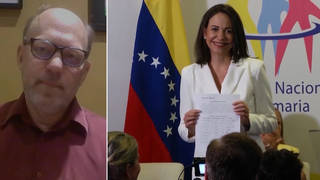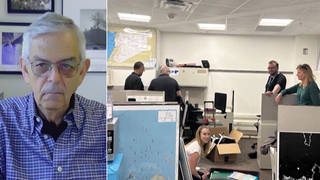
Guests
- Jim Hightowerformer Texas agriculture commissioner and former editor of The Texas Observer. He just recently had a talk show on WABC but was kicked off when Disney took it over.
Jim Hightower discusses the need for a powerful and connected independent media, citing three factors that are reason for hope. First, an open class war has been declared by the rich and powerful against the rest of the country, providing fertile ground for organizing. Second, the demand for independent media voices is great. Third, the emergence of Ross Perot and Pat Buchanan indicate interesting times in which progressive and populist voices flourish.
Segment Subjects: Independent media, media conglomeration, progressive movement, populism
Transcript
AMY GOODMAN: “Through unprecedented mergers and acquisitions, the United States has become the world’s only information superpower. Media are morphing at a quicksilver pace, creating a communications landscape far different from that of even 10 years ago. Disney and Time Warner are now among the biggest of a handful of corporations controlling vast global production and distribution capacity. The experts’ term for this is 'synergy.' But as Benjamin Barber in a recent New York Times op-ed, synergy turns out to be just another word for monopoly.”
And that’s the opening paragraph in the introduction to the brochure on the Media and Democracy Congress. It’s a congress that began last night here in San Francisco of over 600 journalists and activists and Internet players who are here to talk about, yes, media and democracy. Are they, or have they become, a contradiction in terms?
The meeting opened last night with a plenary called “Does Journalism Have a Future in a Disney World?” And in just a few minutes, we’re going to go to excerpts of speeches of feminist author Susan Faludi and Daily News columnist and Democracy Now! co-host Juan González. But first we turn to the words of Jim Hightower. He ran for elective office in Texas. He served as Texas’s agriculture commissioner and was editor of The Texas Observer. And this was his speech last night, as he opened the Media and Democracy Congress.
JIM HIGHTOWER: I want to add my welcome and say what an absolute pluperfect joy it is for me to join in this first-ever, three-day, hot-off-the-Internet, not-a-moment-too-soon Media and Democracy Campaign, because it is a campaign. It is not simply a congress.
I was just visiting with some of the labor goons who are here with us here tonight. Show your hands; don’t be ashamed. There you are. One of them told me that they had hopped in a cab to come over here, and cab driver said, “Where are you going?” “Well, we’re going to the Media and Democracy Congress.” Cab driver turned and said, “That’s a contradiction in terms.”
I’m thinking if we do this right over the next three days—and I’m thinking that we will do it right—this is going to be more fun than eating ice cream naked. I mean, think about that. And forward through, that’s a possibility.
I come to you as one who has been on both sides of that reporter’s pad. As Katherine indicated, I was editor of The Texas Observer, served there three years and then in 1980 made the only downward career move you can make from journalism, which was to go into politics.
I continue to make a living without having to have an actual job, which has certainly been my ambition over the years, though, as Katherine indicated, Mickey Mouse has messed with me. But the surprise was not that I was bounced from my ABC radio talk show, but that I got in an ABC radio talk show to begin with, managing to stay on the air for a year and a half preaching pure, unadulterated working people’s populism. So when Disney took over ABC last summer and promptly showed its corporate muscle by tossing me out the door, tossing the only populist show that there was on national radio, I thought of a tombstone that I had seen once in Boot Hill, Arizona. This tombstone said, “I was expecting this, but not so soon.”
But, you know, Mickey Mouse cannot stop my mouth. Neither can Mickey Mouse stop your mouth. And that’s what we’re gathered here to talk about in this conference, to figure out how it is we can build a more powerful, a more important and a more connected independent media for America.
One thing is very, very clear, and that is that the corporate-conglomerated media is not going to fit our voices into their schedules and pages, so we must build it ourselves. Back in Texas in the Reagan period in 1980s, we had this oil man ran ads on television down there, free enterprise type of ads. Name was Eddie Chiles, Mad Eddie Chiles. He ran these ads, said, “If you don’t own an oil well, git one!” Well, there we have it, don’t we?
As for me, I have become my own conglomerate. I put out daily radio commentaries that I syndicate myself, broadcast to some 78 markets in the country, selling my own advertising. Now I find myself on the World Wide Web, a place that I could not have expected, even two or three or four years ago, that I would be showing that even old codgers like me can be ever so au courant when it is required. You can find my scripts, you can find the audio of my radio commentaries on the World Wide Web. Putting out a newsletter called The Hightower Lowdown, if you can stand it. Starting up TV commentaries, writing a book, doing the speeches. Last night the pinnacle of my career was achieved when right down the road in Los Angeles a Grammy was given to Asleep at the Wheel. Asleep at the Wheel, a band that did the theme song for my radio show. It gets even juicier than that, because the title of their instrumental that won instrumental of the year is “Hightower.” It is the theme of my radio show. I have achieved it all!
The point of all of this—and I’m sure you’re wondering what it is exactly—is don’t look back, look forward. Just keep plugging. And I’ve got to say, what a wonderful—what a wonderful time to be doing what you and I are doing. There’s an old Slavic proverb: You can fight the gods and still have fun.
I’m going to give you three reasons why I think we live in a very, very fun time. First, there is just damn sure no shortage of material for us to work with. Think about that.
Let us start with the fact that an open class war has been declared by the powerful and the privileged against the rest of us. The rich are not just getting richer, they are getting ridiculous; not merely knocking down the poor, but tromping on the great middle class in this country, the 80 percent of Americans who make less than $50,000, the 80 percent of Americans who do not own stocks and bonds, the 80 percent of America who don’t give a damn about the Dow Jones average but care a lot about the Doug Jones average. These are the people who are being knocked down, knocked down by the Robert Allens of AT&T and his 40,000 employees that he displaced in January of this year. Some of these guys are getting so rich, they can afford to air-condition Hell. And from the way they’re acting, I think they’d better be setting some money aside for that project, don’t you?
You want to talk about material? How about Newt Gingrich, huh? Rooty-toot-toot, here comes the Newt. Now he was hot for a while—’til people began to notice that he’s just another corrupt, egomaniacal, self-dealing, hypocritical whore to the moneyed establishment. There’s that old saying, you know, the higher the monkey climbs, the more you see of its ugly side. I think that’s what happened to Newt.
On the other hand, we have Bill “I Did Not Inhale” Clinton, the best Republican president to come along since Dwight Eisenhower. Some people say we need a third party; I think we could use a second one.
Which brings me to the second reason that I think this is our moment to step forward and shine. There is a tremendous demand out there, a demand for your information, for your viewpoint, for your passion—and, yes indeedy, for your progressivism. Look at any poll, or go down to the chat-and-chew cafe wherever you live and just talk to ordinary folks, and you will find as deep a distrust of today’s media as there is of today’s politicians. The proudest moment that I had on my talk radio show, besides the time I had Pete Seeger on for an hour, was when it—my show began to be referred to as “investigative radio.” My callers wanted information. They wanted passion. They wanted grit. They wanted truth. And I’m not talking about any card-carrying liberals here. I’m not talking about lefties. In fact, I think a good many of them were on a first-name basis with the Unabomber, if you know what I mean. All I’m saying here is that ordinary people, the rank-and-file American, that great middle class of the 80 percent that make less than $50,000 a year, or the half out there who make less than $30,000 a year, these people are looking for alternatives, alternatives to the establishment, spoon-fed, sugar-coated, Mickey Mouse infotainment that they’re getting in the way of news these days. Big surprise.
Why should we be surprised by this? Look what is happening in the rest of our culture. What is the fastest-growing segment of America’s food economy? Organic food. Pesticide-free, hormone-free, additive-free, fresh-produced, direct-from-the-farm, pure food. People want an alternative to conglomerate food. Our friend Alice Waters in the audience here tonight, the godmother of good food. You don’t do yourself any favor at all in life—go across the Bay and eat at her restaurant.
What is the biggest trend in American medicine? Alternatives. Acupuncture. I do that, and I’m a Texas redneck. Herbs and Chinese medicine, biofeedback, aromatherapy, hospice, other holistic approaches to life and death. People—and I include Republicans in this grouping—want alternative to conglomerate medicine.
What is the biggest demand in politics today? Alternatives. Nearly seven out of 10 American voters now say they want at least one other major political party. In the last congressional election, that big Repubican sweep that led Newt Gingrich to claim a mandate to renew American civilization, six out of 10 American voters did not vote. Two out of 10 marked Republican on the ballot. Half of those said they were voting against the Democrat, not for the Republican. So they had the same 10 percent of corporatists, right-wing nutballs, geezers in golf pants, that they have always had. This is nothing to fear. People want alternatives. The New Party, they’re here. The Green Party, they’re here. And plenty of other plenty progressive parties are not just running with alternatives to the one-party system, they are winning. They are winning offices all across this country, beginning where we must begin: at a grassroots level. It ain’t gonna happen coming down from the top of the hill by someone on a white horse. It is going to happen from the bottom up, if it is going to happen at all. And that’s where we have got to be building. People want alternatives to conglomerate politics.
So if you want to think of the media opportunity, not in movement terms, but in market terms, go right on ahead. Go right on ahead and do that, because the market definitely is demanding alternatives, and you are it. You are the alternative. Our job at this congress is to try to figure out among ourselves how to deliver your product to more of this growing market.
Finally, reason three to think that we are gathered in some kind of historic moment for progressives is that these are important times. The 1840s, the 1880s, 1930s, 1960s, these were epochs of great change. Well, hold on, because here we go again. Anyone who thinks that these times are just more of the same have not been paying attention to Ross Perot and Pat Buchanan. Just start right there. They’ve not been paying attention, either, to the American grassroots. The old political coalitions are adrift. The social contract has been shredded up right in the faces of America’s middle class. And everything political and economic is up for grabs. This is dangerous. This is scary. And ain’t that exciting? It’s our time. It is our moment.
The exciting thing for us, those of us of the progressive persuasion, is that our base is alive and well and out there kicking butt—not nationally, not globally, but very, very locally, in neighborhoods, where these community newspapers and radio stations are based, in towns and cities all across our country. People of common sense and goodwill are coming together on a wide range of issues—economic and environmental racism, classism, living wage campaigns that are being run and won, community schools, community policing, fighting and winning. Our job is not to create a progressive moment, a progressive movement, because it’s already there. It’s already out there. Our job is simply to connect it up, to give it a bigger microphone, if we can, to help its common ground, its common strengths, to give it political identity, and to help it realize its own destiny.
This is no easy challenge, of course. Money is a problem; we don’t have any. Internal bickering, that’s always a problem. Holding progressives together is about like trying to load frogs in a wheelbarrow. But we have no choice. This is our moment. We have to rise above the bickering, starting right here at this congress. We have to figure our way around the money blockages or figure out how to get that money. My own mama taught me that two wrongs don’t make a right, but I soon figured out that three left turns do.
Remember that we have been here before, too. This is important. We have a history. This is not the first time this has ever happened. Old, ordinary riff-raff like us been up against this kind of power before, and found a way around it. Those old-time populists in the 1870s and 1880s, they faced the same kind of trivialization, marginalization that we face today. Did they just wring their hands and say, “Well, we can’t do anything about it; let’s just surrender”? Mm-mmm, they created their own newspapers, their own national magazine, created their own speakers bureau with 20,000 members in it. Think of that, speakers bureau. Do we even have one of those? Twenty thousand people in 1880 could go out on a single night and give the speech. Do we have 20 people going out and give the speech today? Twenty thousand people in a speakers bureau, can’t we do that? They created their own political party.
We can do all of this again and much, much more, because the energy and the talent, the true genius that is in this room. So let’s get it all started, get it all started right here in this congress. Won’t solve all the problems, won’t come out with the big, giant agenda. We don’t have to do all that. We just have to get started, realize that we’re—maybe we didn’t all come over in the same boat, as Jesse Jackson has put it, but we’re on the same boat now. That’s a powerful political reality that we’ve got to adapt—to adopt and adapt to.
I’ll leave you with this thought, because it’s as good as any to kick off this congress. Remember this: No building is too tall for a small dog to lift its leg on. Thank you very much.
AMY GOODMAN: And that was Jim Hightower, former Texas agriculture commissioner and former editor of The Texas Observer. He just recently had a talk show on WABC but was kicked off when Disney took it over. You’re listening to Democracy Now! Coming up next, feminist author Susan Faludi, after this.












Media Options